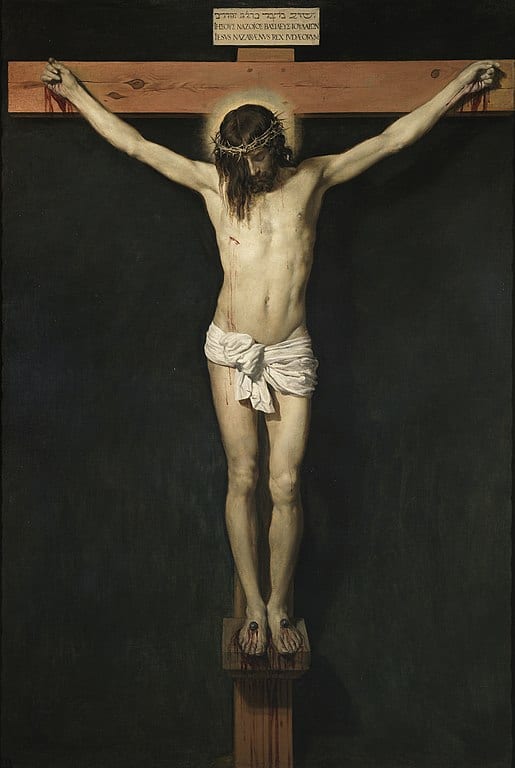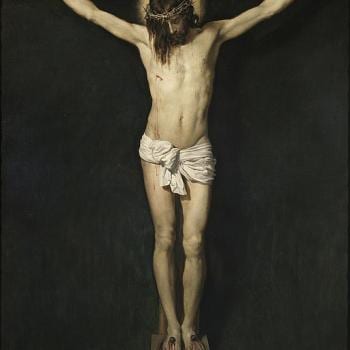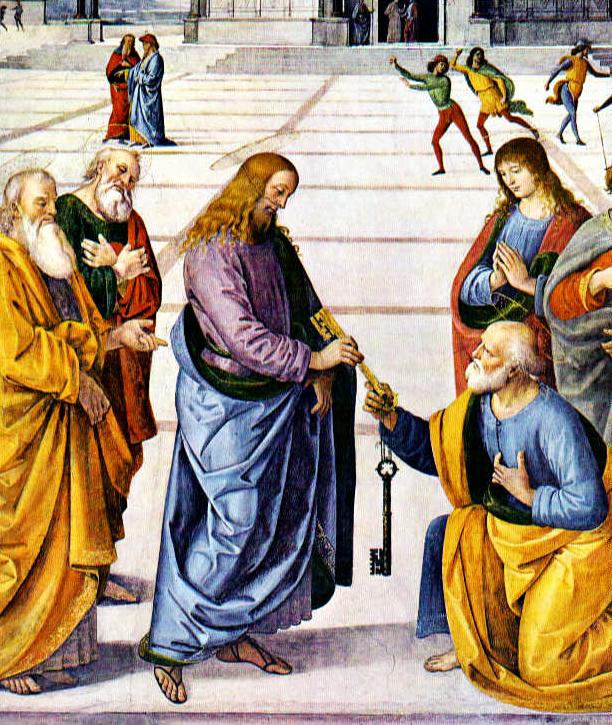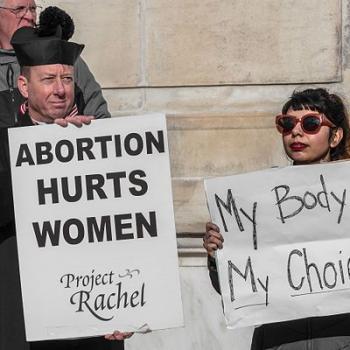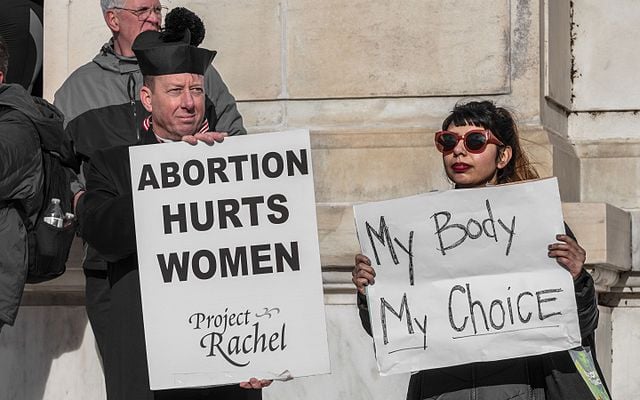
This will be a reply to the James White Opening Argument of a debate between him and Gerry Matatics (article posted on 13 November 1992: transcript of the oral debate that took place on 11-13-92). I will be replying point-by-point to White’s arguments: which virtually never occurs in oral debates such as this.
For example, each person gives their opening statement. But the opponent will almost never systematically refute the opponent’s opening, as I will be doing. In most cases, he or she wouldn’t even know what was in it, prior to the debate. This is the beauty of written debate. It’s much more comprehensive and serious: minus all the grandstanding and carnival barker aspects of live oral debates: which in my opinion are often little more than circuses: although assuredly the Catholic always has a golden opportunity to spread Catholic truth and refute anti-Catholic lies, to a mixed audience, so it’s not a complete loss or waste of time.
When my good friend Gary Michuta debated White on the deuterocanon in May 2004 I was supposed to go with him to Long Island. I wanted to support him, even though I take a dim view of these debates. But we got our signals crossed and I wasn’t able to attend. I would have likely met White at that time. I’m a friendly and cordial, easy-going guy, with everyone. I don’t know how White would have reacted. He has on occasion even refused to shake hands with debate opponents. It would have been fascinating.
I won’t even be reading the Matatics portion (he has now departed the Catholic faith and gone beyond even sedevacantism. Pray for him). So his material won’t influence my answers at all. It will be as if I am debating White all by myself: as I did two-and-a-half years later in writing, in our sole extensive back-and-forth exchange. I’ve written more about sola Scriptura and the rule of faith than any other topic (including three books [one / two / three] and parts of several others), including very extensive debates on patristic views, so I have plenty to say! I’m eagerly looking forward to it!
See my Introduction to what will be a very long series (and the other installments). Words of James White will be in blue.
[Link to Part 2 of this reply]
*****
Opening Argument
I want to take you back, as we discuss sola Scriptura this evening, to the period following the Council of Nicaea in 325. You may recall from your church history that the Council of Nicaea the full deity of Our Lord Jesus Christ was affirmed by the council–that Jesus Christ was not a creature, he was not a created being– yet you may also be aware that in the period that followed the Council of Nicaea, for the next number of decades, Arianism reigned supreme in the Church. For example, Athanasius, the great bishop, was driven from his See five times during the period of time following Nicaea because of the political activities of the Arians. During that particular period of time, Athanasius, writing to his friend, Adelphius, against the Arians, wrote the following. Please listen closely.
Such then, as we have above described is the madness and daring of those men (speaking of the Arians). But our faith is right and starts from the teaching of the Apostles and tradition of the fathers, being confirmed both by the New Testament and the Old. For the Prophets say, ‘Behold, the virgin shall conceive and bear a son and they shall call his name ‘Immanuel’ which is being interpreted ‘God with us.’ What does that mean, if not that God has come in the flesh? While the apostolic tradition teaches in the words of blessed Peter, ‘For as much then as Christ suffered for us in the flesh’ and in what Paul writes, ‘Looking for the blessed hope and appearing of our great God and Savior, Jesus Christ.’
Now why do I bring this to your attention? First of all, if you read Athanasius’ letter, he argues solely from the Scriptures as the rule of faith against the Arians.
His summary statement is patently false. It’s as if he literally has blinders on and can’t read this statement from St. Athanasius. Thus, I have bolded the “tradition” sections. Clearly, Athanasius believes that apostolic / patristic tradition (including apostolic succession) is part of the rule of faith alongside Scripture. The Catholic rule of faith is a “three-legged stool”: including also magisterial Church proclamations (such as these very ones at the Council of Nicaea that White alluded to). It’s completely consistent with the Catholic view. How odd, then, that White seems to think it supports his view.
He argues that this is what defines what Christians are to believe. In fact, if you listened to the passages that he cited, for example, Titus 2:13, a passage that I have often cited in dealing with modern Arians and there are many of them out there today–Jehovah’s Witnesses, The Way International, individuals who deny the deity of Christ–Titus 2:13 is one of the passages that I have frequently used as well. He uses those same Scriptures and he defines the apostolic tradition by the words of Scripture. Apostolic tradition, in this letter from Athanasius, refers to the Scriptures and that may explain why this same writer, Athanasius, said, for example, “The holy and inspired Scriptures are sufficient of themselves for the preaching of the truth.” And he also said, “These canonical books are the fountain of salvation so that he who thirsts may be satisfied with the oracles contained in them. In these alone the school of piety preaches the Gospel. Let no man add or take away from them.”
This is what we get from White as regards Athanasius, before he moves onto St. Basil the Great and Holy Scripture. I’ve been through this routine and runaround in analyzing the fathers and the rule of faith over and over with Protestants. They cite what seems at first glance to support their view, while ignoring other relevant passages from any given Church father, that go against their view and support ours. It’s all half-truths and partial truths, which give a distorted overall picture.
I wrote extensively about St. Athanasius’ rule of faith in June 2003, and again (replying to White) in April 2007. Let’s see what Athanasius thought about these matters: his entire outlook, and the whole truth: not just carefully selected passages. I can’t cite everything (read the links for that), but I will hit the major highlights:
[L]et us look at the very tradition, teaching, and faith of the Catholic Church from the beginning, which the Lord gave, the Apostles preached and the Fathers kept. (To Serapion 1:28)
But after him and with him are all inventors of unlawful heresies, who indeed refer to the Scriptures, but do not hold such opinions as the saints have handed down, . . . (Festal Letter 2:6)
We may see easily, if we now consider the scope of that faith which we Christians hold, and using it as a rule, apply ourselves, as the Apostle teaches, to the reading of inspired Scripture. (Discourse Against the Arians 3:28)
See, we are proving that this view has been transmitted from father to father; but ye, O modern Jews and disciples of Caiaphas, how many fathers can ye assign to your phrases? . . . that which from the beginning those who were eye-witnesses and ministers of the Word have handed down to us. For the faith which the Council has confessed in writing, that is the faith of the Catholic Church; to assert this, the blessed Fathers so expressed themselves while condemning the Arian heresy; . . . (Defense of the Nicene Definition, 27; A.D. 355; in NPNF2, IV:168-169)
But the sectaries,who have fallen away from the teaching of the Church, and made shipwreck concerning their Faith . . . (Contra Gentes, 6; A.D. 318, in NPNF2, XIV:7)
For, what our Fathers have delivered, this is truly doctrine; and this is truly the token of doctors, to confess the same thing with each other, and to vary neither from themselves nor from their fathers; whereas they who have not this character are to be called not true doctors but evil. (De Decretis 4; A.D. 351, in NPNF2,IV:153)
[The Fathers at Nicea]…but concerning matters of faith, they did not write: ‘It was decided,’ but ‘Thus the Catholic Church believes.’ And thereupon they confessed how they believed. This they did in order to show that their judgement was not of more recent origin, but was in fact Apostolic times; and that what they wrote was no discovery of their own, but is simply that which was taught by the apostles. (De Synodis 5; A.D. 362,in NPNF2,IV:453)
The blessed Apostle approves of the Corinthians because, he says, ‘ye remember me in all things, and keep the traditions as I delivered them to you’ (1 Cor. xi. 2); . . . (De Synodis 14; A.D. 362, in NPNF2, IV:453)
But the word of the Lord which came through the ecumenical Synod at Nicea, abides forever. (Ad Afros 2; A.D. 372, in NPNF2, IV:489)
Remaining on the foundation of the Apostles, and holding fast the traditions of the Fathers, . . . so that all every where may ‘say the same thing’ (1 Cor. i. 10), and think the same thing, and that, . . . it may be said and confessed in every Church, ‘One Lord, one faith, one baptism’ (Eph. iv. 5), . . . (De Synodis 54; A.D. 362, in NPNF2, IV:453)
[B]e ye all zealous for the Lord; hold fast, every one, the faith we have received from the Fathers, which they who assembled at Nicaea recorded in writing, and endure not those who endeavour to innovate thereon. . . .
Had these expositions of theirs proceeded from the orthodox, from such as the great Confessor Hosius, and Maximinus of Gaul, or his successor, or from such as Philogonius and Eustathius, Bishops of the East, or Julius and Liberius of Rome, or Cyriacus of Moesia, or Pistus and Aristaeus of Greece, or Silvester and Protogenes of Dacia, or Leontius and Eupsychius of Cappadocia, or Caecilianus of Africa, or Eustorgius of Italy, or Capito of Sicily, or Macarius of Jerusalem, or Alexander of Constantinople, or Paederos of Heraclea, or those great Bishops Meletius, Basil, and Longianus, and the rest from Armenia and Pontus, or Lupus and Amphion from Cilicia, or James and the rest from Mesopotamia, or our own blessed Alexander, with others of the same opinions as these;–there would then have been nothing to suspect in their statements, for the character of APOSTOLICAL MEN is sincere and INCAPABLE OF FRAUD. (Ad Episcopos 8; A.D. 372,in NPNF2, IV:227)
(NPNF2 = Philip Schaff, et al., editors, A Select Library of Nicene and Post-Nicene Fathers of the Church Fathers, 14 volumes, Series 2)
J. N. D. Kelly, the Anglican patristic scholar, summarizes what Athanasius and the fathers actually believed about the rule of faith (and it ain’t sola Scriptura):
So Athanasius, disputing with the Arians, claimed that his own doctrine had been handed down from father to father, whereas they could not produce a single respectable witness to theirs . . .. . . the ancient idea that the Church alone, in virtue of being the home of the Spirit and having preserved the authentic apostolic testimony in her rule of faith, liturgical action and general witness, possesses the indispensable key to Scripture, continued to operate as powerfully as in the days of Irenaeus and Tertullian . . . Athanasius himself, after dwelling on the entire adequacy of Scripture, went on to emphasize the desirability of having sound teachers to expound it. Against the Arians he flung the charge that they would never have made shipwreck of the faith had they held fast as a sheet-anchor to the . . . Church’s peculiar and traditionally handed down grasp of the purport of revelation. . . .
It should be unnecessary to accumulate further evidence. Throughout the whole period Scripture and tradition ranked as complementary authorities, media different in form but coincident in content. To inquire which counted as superior or more ultimate is to pose the question in misleading terms. If Scripture was abundantly sufficient in principle, tradition was recognized as the surest clue to its interpretation, for in tradition the Church retained, as a legacy from the apostles which was embedded in all the organs of her institutional life, an unerring grasp of the real purport and meaning of the revelation to which Scripture and tradition alike bore witness. (Early Christian Doctrines, San Francisco: HarperCollins, revised edition, 1978, 45, 47-48)
When the early Church Father, Basil, was attacked by his opponents regarding his beliefs about the Godhead, he replied much like Athanasius. When his opponents talked about the customs they had he responded, “If custom is to be taken in proof of what is right then it is certainly competent for me to put forward on my side the custom which obtains here. If they reject this, we are clearly not bound to follow them.” Listen closely. “Therefore, let God-inspired Scripture decide between us and on whichever side be found doctrines in harmony with the Word of God, in favor of that side will be cast the vote of truth.”
Yes, Scripture is unique, being inspired revelation, and it can resolve almost all theological questions in and of itself. But it refers to sacred tradition and Church authority: so we can’t discount the latter two. I have written about Basil’s rule of faith in August 2003 and November 2013. Some highlights:
Let us now investigate what are our common conceptions concerning the Spirit, as well those which have been gathered by us from Holy Scripture concerning It as those which we have received from the unwritten tradition of the Fathers. (The Holy Spirit, 9:22)
The one aim of the whole band of opponents and enemies of “sound doctrine” is to shake down the foundation of the faith of Christ by leveling apostolic tradition with the ground, and utterly destroying it. So like the debtors, – of course bona fide debtors. – they clamour for written proof, and reject as worthless the unwritten tradition of the Fathers. (The Holy Spirit, 10:25)
Of the dogmas and messages preserved in the Church, some we possess from written teaching and others we receive from the tradition of the apostles, handed on to us in mystery. In respect to piety, both are of the same force. No one will contradict any of these, no one, at any rate, who is even moderately versed in matters ecclesiastical. Indeed, were we to try to reject unwritten customs as having no great authority, we would unwittingly injure the gospel in its vitals; or rather, we would reduce [Christian] message to a mere term. (The Holy Spirit 27:66 [A.D. 375])
For instance, to take the first and most general example, who is there who has taught us in writing to sign with the sign of the cross those who have trusted in the name of our Lord Jesus Christ? What writing has taught us to turn to the East at the prayer? Which of the saints has left us in writing the words of the invocation at the displaying of the bread of the Eucharist and the cup of blessing? For we are not, as is well known, content with what the apostle or the Gospel has recorded, but both in preface and conclusion we add other words as being of great importance to the validity of the ministry, and these we derive from unwritten teaching. Moreover we bless the water of baptism and the oil of the chrism, and besides this the catechumen who is being baptized. On what written authority do we do this? Is not our authority silent and mystical tradition? Nay, by what written word is the anointing of oil itself taught? And whence comes the custom of baptizing thrice? And as to the other customs of baptism from what Scripture do we derive the renunciation of Satan and his angels? Does not this come from that unpublished and secret teaching which our fathers guarded in a silence out of the reach of curious meddling and inquisitive investigation? (The Holy Spirit, 27:66)
Time will fail me if I attempt to recount the unwritten mysteries of the Church. Of the rest I say nothing; but of the very confession of our faith in Father, Son, and Holy Ghost, what is the written source? . . . If they deprecate our doxology on the ground that it lacks written authority, let them give us the written evidence for the confession of our faith and the other matters which we have enumerated. While the unwritten traditions are so many, and their bearing on “the mystery of godliness is so important, can they refuse to allow us a single word which has come down to us from the Fathers; – which we found, derived from untutored custom, abiding in unperverted churches; . . .? (The Holy Spirit, 27:67)
Is answer to the objection that the doxology in the form “with the Spirit” has no written authority, we maintain that if there is no other instance of that which is unwritten, then this must not be received. But if the greater number of our mysteries are admitted into our constitution without written authority, then, in company with the many others, let us receive this one. For I hold it apostolic to abide also by the unwritten traditions. “I praise you,” it is said, “that ye remember me in all things, and keep the ordinances as I delivered them to you;” and “Hold fast the traditions which ye have been taught whether by word, or our Epistle.” One of these traditions is the practice which is now before us, which they who ordained from the beginning, rooted firmly in the churches, delivering it to their successors, and its use through long custom advances pace by pace with time. (The Holy Spirit, 27:71)
. . . that doctrine, which by the tradition of the Fathers has been preserved by an unbroken sequence of memory to our own day. (The Holy Spirit, 30:79)
These, brethren, are the mysteries of the Church; these are the traditions of the Fathers. Every man who fears the Lord, and is awaiting God’s judgment, I charge not to be carried away by various doctrines. If any one teaches a different doctrine, and refuses to accede to the sound words of the faith, rejecting the oracles of the Spirit, and making his own teaching of more authority than the lessons of the Gospels, of such an one beware . . . ( Letter 261)
Protestant patristics expert J. N. D. Kelly cites these sections in his footnotes and comments:
Basil made the liturgical custom of baptizing in the threefold name a pivot in his argument for the coequality of the Spirit with Father and Son, pleading that the apostolic witness was conveyed to the Church in the mysteries as well as in Scripture, and that it was apostolic to abide by this unwritten tradition. (Early Christian Doctrines, HarperSanFrancisco, revised 1978 edition, 45)
What then, is Sola Scriptura?
Well, the doctrine of Sola Scriptura simply states that the Scriptures and the Scriptures alone are sufficient to function as the regula fide, the rule of faith, for the Church. All that one must believe to be a Christian is found in Scripture and in no other source. That which is not found in Scripture is not binding upon the Christian conscience. To be more specific, I provide the following definition. The Bible claims to be the sole and sufficient rule of faith for the Christian Church. The Scriptures are not in need of any supplement. Their authority comes from their nature as God-breathed revelation. Their authority is not dependent upon man, church or council. The Scriptures are self-consistent, self-interpreting and self-authenticating. The Christian Church looks to the Scriptures as the only and sufficient rule of faith and the Church is always subject to the Word and is constantly reformed thereby.
I agree that this is how Protestants define sola Scriptura. The only thing I would add is the word infallible; i.e., [for Protestants] “Scripture is the only infallible rule of faith.” This denies the infallibility of councils and sacred tradition. This word was used in the important recent definitions of Protestant apologists Norman Geisler and Keith A. Mathison, and in fact, was used by White himself in his book, The Roman Catholic Controversy (1996). See the Introduction of my book, 100 Biblical Arguments Against Sola Scriptura (Catholic Answers Press, 2012) for the full quotations.
In II Timothy 3:16 we read that “All Scripture is God-breathed and is profitable for doctrine, for reproof, for instruction, for training in righteousness, in order that the man of God might be complete, fully equipped for every good work.” We learn from this that Scripture’s authority is God’s authority. You don’t have Scriptural authority over here then God’s authority over here. You don’t have different authorities in the Church. The authority of the Church is one: God’s authority. And when God speaks in Scripture that carries His authority.
Yes, but it doesn’t follow that it is the only infallible and binding authority in Christianity. This classic “proof text” for sola Scriptura is in fact not what it is purported to be at all. I have written about it:
Sola Scriptura, 2 Tim 3:16-17, & “Man of God” [1-27-12]
Answer to Sola Scriptura “Prooftexts” 2 Timothy 3:16-17 & Romans 16:15-16 (vs. David T. King) [6-26-12]
Notice, for example, from the words of Our Lord Jesus Christ in Matthew 22 when he is talking with the Sadducees, who denied the resurrection, he says, “You are in error because you do not know the Scriptures, nor the power of God, for in the resurrection, they neither marry nor are given in marriage but are as the angels in Heaven. But concerning the resurrection of the dead have you not read what God spoke to you, saying ‘I am the God of Abraham, the God of Isaac and the God of Jacob.’” Please notice that from the Lord Jesus’ perspective that which was found in Scripture was God speaking and he held those men responsible for what God had said to them, even though what was spoken had been written a thousand years earlier. Scripture is God speaking to man. It is theopneustos. God-breathed.
Yes, of course it is. No one disagrees. But that is different from the assertion that it is the sole, exclusive, only infallible authority in the Christian life. It’s not, and Scripture itself teaches that it is not, since it asserts both authoritative tradition and authoritative, binding Church decrees.
Note as well Peter’s words in II Peter 1:20-21, “Knowing this first of all that no Scriptural prophecy ever came about by the prophet’s own interpretation. For no prophecy ever was born by the will of man. Rather, while being carried along by the Holy Spirit, men spoke from God.” That is why the Scriptures can function as a rule of faith for the Church, because they are God-breathed. What God says is the final authority for the Church.
All Scripture has to be interpreted, and the authoritative interpretation comes from the Church and sacred tradition. Hence:
Acts 8:30-31 (RSV) So Philip ran to him, and heard him reading Isaiah the prophet, and asked, “Do you understand what you are reading?” [31] And he said, “How can I, unless some one guides me?”
2 Peter 3:15-16 . . . our beloved brother Paul wrote to you according to the wisdom given him, [16] speaking of this as he does in all his letters. There are some things in them hard to understand, which the ignorant and unstable twist to their own destruction, as they do the other scriptures.
This was understood even in the old covenant:
Nehemiah 8:8 And they [the Levites] read from the book, from the law of God, clearly; and they gave the sense, so that the people understood the reading.
The great reformer of Geneva, John Calvin, said concerning this, “This, then, is the difference. Our opponents (speaking of the Roman Catholic Church) locate the authority of the Church outside God’s Word, that is, outside of Scripture and Scripture alone.
This is false. We locate it (as the Bible does) in Holy Scripture, in the Holy Church, and in Sacred Tradition: all harmoniously working together like the three legs of a stool: all necessary. Protestant historian Philip Schaff noted that even the founder of Protestantism, Martin Luther made a very strong statement indeed, in favor of an authoritative Church and tradition, as regards the real presence in the Eucharist. Luther wrote, in a letter to Albrecht, Margrave of Brandenburg and Duke of Prussia, dated April 1532 by some and February or early March by others:
Moreover, this article has been unanimously believed and held from the beginning of the Christian Church to the present hour, as may be shown from the books and writings of the dear fathers, both in the Greek and Latin languages, — which testimony of the entire holy Christian Church ought to be sufficient for us, even if we had nothing more. For it is dangerous and dreadful to hear or believe anything against the unanimous testimony, faith, and doctrine of the entire holy Christian Church, as it has been held unanimously in all the world up to this year 1500. Whoever now doubts of this, he does just as much as if he believed in no Christian Church, and condemns not only the entire holy Christian Church as a damnable heresy, but Christ Himself, and all the Apostles and Prophets, who founded this article, when we say, ‘I believe in a holy Christian Church,’ to which Christ bears powerful testimony in Matt. 28.20: ‘Lo, I am with you alway, to the end of the world,’ and Paul, in 1 Tim. 3.15: ‘The Church is the pillar and ground of the truth.’ (italics are Schaff’s own; cf. abridged [?] version in Preserved Smith, The Life and Letters of Martin Luther [Boston and New York: Houghton Mifflin Company, 1911], pp. 290-292; Johann Adam Mohler, Symbolism, 1844, p. 400)
Now this assertion of a second inspired source of God’s truth has led, I feel, to some tremendously false beliefs.
We don’t believe that tradition and Church proclamations are ‘inspired” but rather, infallible and authoritative / binding under certain carefully specified conditions. This is a surprising mistake from White on an elementary matter.
For example, John O’Brien, author of the popular work The Faith of Millions, wrote in a pamphlet entitled Finding Christ’s Church, “Great as is our reverence for the Bible, reason and experience compel us to say that it alone is not a competent nor a safe guide as to what we are to believe.” That is certainly not what I believe to be the faith of the Church historically or in any other way. As time permits this evening we shall see that such was not the view of the Apostles, of the Lord Jesus Christ, the prophets of old or the early fathers.
Nonsense. Philip (Acts 8:30-31) and Peter (2 Pet 3:15-16) thought the Bible needed to be interpreted, and so did the writer of Nehemiah (8:8): see all above. The need to be properly interpreted takes nothing away from the Bible. It’s simply how it is, since the Bible is a book, and a rather complex one. Not everyone can figure it out on their own. And as Mr. White well knows, the heresies of history like the Arians and Gnostics and their successors today, like Mormons and Jehovah’s Witnesses, all appeal to Scripture, and all think their grossly mistaken interpretation is the correct one. The Arians were the sola Scipturists of their time, while the fathers in the Catholic Church (like Athanasius and Basil above), appealed not to Scripture alone, but rather, to apostolic succession and things believed from the beginning, to prove that Catholicism was true and Arianism false.
But right now, I want to focus our attention on what this debate must be about. To defend sola Scriptura is, in a sense, impossible. Why? Well, because sola scripture is a negative. It is a statement that there is no other source of authority for the Church.
It wouldn’t / shouldn’t be difficult to prove at all if in fact this were the biblical teaching. All White or any Protestant would have to do is produce the Bible passages that assert that only the Bible is an infallible authority / rule of faith. This they have never done, and never will, because it ain’t there! Nothing even comes close. Therefore, what they assert is (how ironic!) merely an arbitrary tradition of man, since it can’t be located in the Bible itself. Sola Scriptura is also a viciously logically circular assertion. If the Bible is the only such infallible authority, then obviously, the claim that it is so would have to come from itself, in the nature of the case. As it does not, the claim collapses in a heap.
Well, the Roman Catholic position must demonstrate that that the “oral tradition” that is supposed to exist not only contains revelation from God that differs in content from what is found in the New Testament, but that this “oral tradition” is theopneustos, that is, God-breathed, inspired.
White again commits basic category mistakes: twice. We don’t claim that oral tradition is “revelation” (although the oral teaching delivered to Moses from God on Mt. Sinai would be that). Nor do we claim it is inspired. He wrongly assumes that the only binding and infallible authority in Christianity is Holy Scripture; hence that only inspired revelation can be binding. But the Bible simply doesn’t teach either of his claims here. He’s pulling them out of a hat from late-arriving, Protestant man-made and unbiblical tradition. The burden of proof is on White to show that Scripture does teach these novel concepts. Maybe he attempts that later in the debate, but it’s not in his opening.
The Bible asserts an authoritative, infallible tradition and Church, and in so doing, it refutes this myth of sola Scriptura. The Bible never states anything remotely like, “all that the believer is bound and required to believe is explicitly found in the pages of this Bible.” And even if it did say that, the contents of the Bible itself were determined by sacred tradition and the Catholic Church: so that we don’t even get the Bible without those authorities and authoritative proclamations and traditions. In other words, authoritative and infallible sacred tradition is inevitable and inescapable. And so is the Church, which authoritatively declared which books were in the Bible and inspired (which were intrinsically inspired, as the Catholic Church teaches: not just because the Church said so).
Without such a demonstration, the denial of sola Scriptura is empty and meaningless
This doesn’t follow at all because of the ludicrous category mistakes that White just made. All we have to do is demonstrate that Scripture teaches an authoritative (not inspired or revelatory) tradition and Church: which it does, and which is rather easy to show. I’ve done so myself, many times (see both my Bible & Tradition web page and Church web page: especially the papers on the Jerusalem Council). Then of course it would be a separate argument to specifically identify said traditions. But the Bible merely granting tradition and Church per se, binding authority as a general principle, is more than enough to demolish sola Scriptura.
White’s and Protestants’ burden of proof, on the other hand, is much harder (and I say, impossible): provide a verse that spells out the definition of sola Scriptura and all of its essential elements: Scripture as the only infallible binding, authority in the Christian life. I’ll save them a ton of trouble in looking for such a passage. It doesn’t exist. So all this is literally much ado about nothing: a mythical supposedly “biblical” view that never was from the start. It only began when Martin Luther was backed into a corner at the Leipzig Disputation in June-July 1519, and had to come up with a position that would undermine Church and conciliar authority. So he espoused the historic heretics’ denial of apostolic succession and the default position of “Bible Only” as a rule of faith. This is where it originated (outside of the heretics throughout history); not in the Bible itself.
Remember the title of the debate. We are talking about an infallible rule. Is the Bible the only infallible rule? And the only way to demonstrate that’s wrong is to point to another infallible rule, that when placed next to Scripture shows that Scripture is not unique in being God-breathed, inspired revelation from God. That is the task that lies before us.
Ah, now he has used the word “infallible” that should have been in his definition earlier. But fair enough. It’s here now. Again, he posits the absurd notion that either tradition or the Church is, or “must” be “inspired.” It’s essentially a straw man or a diversion tactic. If we don’t think in White’s confused, convoluted categories, then we can’t possibly succeed in our task. Nice try, clever, but no cigar . . . The clearest and most unanswerable proofs of authoritative Church and tradition lie in the exegesis of 1 Timothy 3:15 and the Jerusalem Council. Here is how I argued regarding the former in my book, 100 Biblical Arguments Against Sola Scriptura (2012, pp. 104-107, #82):
1 Timothy 3:15 if I am delayed, you may know how one ought to behave in the household of God, which is the church of the living God, the pillar and bulwark of the truth.
Pillars and foundations support things and prevent them from collapsing. To be a “bulwark” of the truth, means to be a “safety net” against truth turning into falsity. If the Church could err, it could not be what Scripture says it is. God’s truth would be the house built on a foundation of sand in Jesus’ parable. For this passage of Scripture to be true, the Church could not err — it must be infallible. A similar passage may cast further light on 1 Timothy 3:15:
Ephesians 2:19-21 . . . you are fellow citizens with the saints and members of the household of God, [20] built upon the foundation of the apostles and prophets, Christ Jesus himself being the cornerstone, [21] in whom the whole structure is joined together and grows into a holy temple in the Lord;
1 Timothy 3:15 defines “household of God” as “the church of the living God.” Therefore, we know that Ephesians 2:19-21 is also referring to the Church, even though that word is not present. Here the Church’s own “foundation” is “the apostles and prophets, Christ Jesus himself being the cornerstone.” The foundation of the Church itself is Jesus and apostles and prophets.
Prophets spoke “in the name of the Lord” (1 Chron 21:19; 2 Chron 33:18; Jer 26:9), and commonly introduced their utterances with “thus says the Lord” (Is 10:24; Jer 4:3; 26:4; Ezek 13:8; Amos 3:11-12; and many more). They spoke the “word of the Lord” (Is 1:10; 38:4; Jer 1:2; 13:3, 8; 14:1; Ezek 13:1-2; Hos 1:1; Joel 1:1; Jon 1:1; Mic 1:1, et cetera). These communications cannot contain any untruths insofar as they truly originate from God, with the prophet serving as a spokesman or intermediary of God (Jer 2:2; 26:8; Ezek 11:5; Zech 1:6; and many more). Likewise, apostles proclaimed truth unmixed with error (1 Cor 2:7-13; 1 Tim 2:7; 2 Tim 1:11-14; 2 Pet 1:12-21).
Does this foundation have any faults or cracks? Since Jesus is the cornerstone, he can hardly be a faulty foundation. Neither can the apostles or prophets err when teaching the inspired gospel message or proclaiming God’s word. In the way that apostles and prophets are infallible, so is the Church set up by our Lord Jesus Christ. We ourselves (all Christians) are incorporated into the Church (following the metaphor), on top of the foundation.
1 Peter 2:4-9 Come to him, to that living stone, rejected by men but in God’s sight chosen and precious; [5] and like living stones be yourselves built into a spiritual house, to be a holy priesthood, to offer spiritual sacrifices acceptable to God through Jesus Christ. [6] For it stands in scripture: “Behold, I am laying in Zion a stone, a cornerstone chosen and precious, and he who believes in him will not be put to shame.” [7] To you therefore who believe, he is precious, but for those who do not believe, “The very stone which the builders rejected has become the head of the corner,” [8] and “A stone that will make men stumble, a rock that will make them fall”; for they stumble because they disobey the word, as they were destined to do. [9] But you are a chosen race, a royal priesthood, a holy nation, God’s own people, that you may declare the wonderful deeds of him who called you out of darkness into his marvelous light. (cf. Isa 28:16)
Jesus is without fault or untruth, and he is the cornerstone of the Church. The Church is also more than once even identified with Jesus himself, by being called his “Body” (Acts 9:5 cf. with 22:4 and 26:11; 1 Cor 12:27; Eph 1:22-23; 4:12; 5:23, 30; Col 1:24). That the Church is so intimately connected with Jesus, who is infallible, is itself a strong argument that the Church is also infallible and without error.
Therefore, the Church is built on the foundation of Jesus (perfect in all knowledge), and the prophets and apostles (who spoke infallible truth, often recorded in inspired, infallible Scripture). Moreover, it is the very “Body of Christ.” It stands to reason that the Church herself is infallible, by the same token. In the Bible, nowhere is truth presented as anything less than pure truth, unmixed with error. That was certainly how Paul conceived his own “tradition” that he received and passed down.
Knowing what truth is, how can its own foundation or pillar be something less than total truth (since truth itself contains no falsehoods, untruths, lies, or errors)? It cannot. It is impossible. It is a straightforward matter of logic and plain observation. A stream cannot rise above its source. What is built upon a foundation cannot be greater than the foundation. If it were, the whole structure would collapse.
If an elephant stood on the shoulders of a man as its foundation, that foundation would collapse. The base of a skyscraper has to hold the weight above it. The foundations of a suspension bridge over a river have to be strong enough to support that bridge.
Therefore, we must conclude that if the Church is the foundation of truth, the Church must be infallible, since truth is infallible, and the foundation cannot be lesser than that which is built upon it. And since there is another infallible authority apart from Scripture, sola scriptura must be false.
The Bible provides another crystal-clear example of the Church exercising its infallible authority in the council of Jerusalem: since it made a pronouncement expressly guided by the Holy Spirit (Acts 15:28-29), which was binding upon the faithful, and proclaimed as such by St. Paul himself, in his missionary journeys:
Acts 16:4 As they went on their way through the cities, they delivered to them for observance the decisions which had been reached by the apostles and elders who were at Jerusalem.
In the same way [as with Mormons] I challenge the Roman Catholic claim that there is an additional revelation from God–this mysterious oral tradition that supposedly needs to be added to the Scriptures to have all that God would have us to have.
It’s not our claim that it is additional revelation, so there is nothing to defend in that respect. White needs to get his facts straight. I think likely he did later on in his career (this stuff is from 1992), but at this point he’s considerably confused about Catholic views. The first rule in debate is to “know thy opponent.” The great debater even knows his opponents’ views better than the opponent does. White is simply setting up straw men and mowing them down, which impresses no one skilled in debate, but is awful amusing.
Now, to win this debate, since Mr. Matatics already agrees with me, I believe, that the Bible is inspired and, hence authoritative, he must demonstrate that there is an oral tradition that is both unique in its contents, that is that it contains revelation other than what we have in the New Testament or the Old Testament and that it is inspired on exactly the same level as the New Testament, that is that it is God-breathed.
He makes the same category mistake again! It’s becoming a pretty bad and ineffective opening statement. We are under no such burden, as this is not our view in the first place. Moreover, certainly the Bible never requires that [technically] non-biblical authority must be inspired. This is simply some fairy tale that White came up with or that he sopped up from some other anti-Catholic polemicist: equally out to sea. The Bible teaches that tradition and Church can be infallible, as I believe I just demonstrated. It need not be “revelation” nor “inspired.” The council of Nicaea was not inspired and not revelation. It was infallible and binding. So was the council of Jerusalem.
If not, if it is on some lower level of inspiration, if it is not God-breathed,
It’s infallible . . .
then obviously you cannot unequally yoke it with the Bible. It cannot be an equal authority. Oral tradition must be inspired in exactly the same way as the Scriptures for it to function as Rome has claimed.
Nonsense again. The proper way to put it (in a far more learned and properly nuanced way than Mr. White does) is how Anglican Dr. Kelly did (cited above):
Scripture and tradition ranked as complementary authorities, media different in form but coincident in content. To inquire which counted as superior or more ultimate is to pose the question in misleading terms. If Scripture was abundantly sufficient in principle, tradition was recognized as the surest clue to its interpretation, . . .
And Protestant historian Heiko Oberman, describing the views of “the pre-Augustinian Church” adds: “Only within the Church can this kerygma be handed down undefiled . . .” (The Harvest of Medieval Theology, Grand Rapids, Michigan: Eerdmans, revised 1967 edition, 367).
My patience is just about exhausted by this point, but by God’s grace, I shall continue on to the end of the Opening Statement.
I’d like to ask you to look with me at Matthew 15:1-6. I will begin, as time is fleeting, with verse 3, “Jesus replied, ‘Why do you break the command of God for the sake of your tradition? For God said, ‘Honor your father and mother and anyone who curses his father and mother must be put to death.’ But you say that if a man says to his father or mother, ‘Whatever help you might otherwise have received from me as a gift devoted to God,’ he is not to honor his father with it. Thus you nullify the Word of God for the sake of your tradition.”
. . . so what did the Lord Jesus do? What he tell all of us to do? To test that teaching, that tradition, not just corrupt tradition, any tradition, on the basis of the Scriptures. “Thus (verse 6) you nullify the Word of God for the sake of your tradition.” Obviously the Word of God does not fall into the category of tradition in that passage, does it? And yet it does in so many Roman Catholic writings as a part of sacred tradition. Tradition is tested by Scripture.
Yes it is, and Scripture is canonized by tradition and Church authority, and Scripture is authoritatively interpreted within a received orthodox community, that received a passed-down tradition of interpretation and orthodoxy by means of Holy Spirit-led apostolic succession. All of that can be shown to be clear biblical teaching, and I have done some of it above. I would be delighted to apply White’s principle in the last sentence to his own views on the rule of faith. I’ve been testing the man-made unbiblical tradition of sola Scriptura by the criterion of Scripture, and it fails miserably. It itself is never asserted there, and contrary (refuting) views are frequently asserted. Conclusion: it is a false and unbiblical (i.e., contrary to the Bible) tradition of men and must be discarded. As St. John stated: “no lie is of the truth.” (1 Jn 2:21).
Now one of the most important passages that we need to look at is II Thessalonians 2:13-15. Let me read just verse 15. I’ll read verses 13 and 14 in a moment. “Therefore, brothers, stand firm and hold fast to the traditions which you were taught either by word or by a letter of ours.” Now it is alleged by Roman Catholic apologists that here you have a positive command to pass on the oral tradition as a separate tradition, separate from the written, that this is to be passed on through the Church down through the ages. But is that what we have here? No, this is a command to stand firm and hold fast to a single body of traditions already delivered to the believers. There is nothing future about this passage at all. He says to stand firm and hold fast to traditions that will be delivered? No, already has been delivered to the entire church, not just the episcopate, not just the bishops, but to everyone in the church at Thessalonica.
This is absurd because 2 Thessalonians was one of the earliest books of the New Testament: dated around 50 AD by conservative Bible scholars (e.g., Introduction to the New Testament, Zondervan, 1992, by D. A. Carson, Douglas J. Moo, and Leon Morris, p. 347). The same book states that “the preponderance of evidence” dates the Gospel of Matthew “most probably during the sixties” (p. 79). As for Mark, they conclude: “either in the late fifties or the middle sixties. While the latter is the majority view, we favor the late fifties” (p. 99). They date Luke in “the early 60s” (p. 116), and as for the Gospel of John, “we may very tentatively advance A.D. 80-85” (p. 167). Thus, none of the four Gospels had yet been written by this time, let alone “delivered” to the Thessalonians (or anyone else).
This raises several insuperable problems for the good Bishop White. If he wants to say that this injunction has no reference to the future, he excludes the Gospels, as well as most of the rest of the New Testament. That would be quite a stunted, incomplete new covenant tradition and rule of faith to live by. If he ditches that desperate, unfounded assertion, his argument collapses, and he must concede some sense of ongoing tradition.
Secondly, White’s overall argument is that any legitimate tradition is eventually “inscripturated”: which is its basis of validation. For him, there is no valid tradition that does not end up in the Bible. Needless to say, such an idea is never stated in the Bible, and is yet another arbitrary tradition of men, based on nothing but wishful thinking and special pleading. But assume it is true for a moment, for the sake of argument. That would mean that Paul is commanding his hearers to “hold fast” to to all these traditions that were not yet in the Bible (which Bible was not completed till around 100 AD and not finally canonized till the late fourth century). And these even include oral traditions (“by word” as distinct from “by a letter”). One can see that his position is hopelessly incoherent.
Much more sensible and plausible in interpreting this passage is the Catholic view that there was an identifiable body of apostolic tradition (whether yet in the Bible or even if it never made it into the Bible) that is consistent with Christian teaching, including the Bible, and which was passed down and authorized by the Catholic Church. In other words, it’s perfectly consistent with the Catholic rule of faith as it has always been, but literally impossible to synthesize with sola Scriptura.
This single body of traditions was taught in two ways. First, orally, that is, when Paul was personally with the Thessalonians, and by epistle, that being the first letter of Paul to the Thessalonians. Now, what does the term “orally” refer to? For the Roman Catholic to use this passage to support his position, two things must be established. First, that the oral tradition element refers to a specific passing on of revelation to the power of the episcopate and secondly that what is passed on is different in substance from what is found in the New Testament.
White again confuses legitimate tradition with “revelation.” Vatican II: Dei Verbum (Dogmatic Constitution on Divine Revelation) very eloquently explains the much more coherent and biblical Catholic view:
9. Hence there exists a close connection and communication between sacred tradition and Sacred Scripture. For both of them, flowing from the same divine wellspring, in a certain way merge into a unity and tend toward the same end. For Sacred Scripture is the word of God inasmuch as it is consigned to writing under the inspiration of the divine Spirit, while sacred tradition takes the word of God entrusted by Christ the Lord and the Holy Spirit to the Apostles, and hands it on to their successors in its full purity, so that led by the light of the Spirit of truth, they may in proclaiming it preserve this word of God faithfully, explain it, and make it more widely known. Consequently it is not from Sacred Scripture alone that the Church draws her certainty about everything which has been revealed. Therefore both sacred tradition and Sacred Scripture are to be accepted and venerated with the same sense of loyalty and reverence.
10. Sacred tradition and Sacred Scripture form one sacred deposit of the word of God, committed to the Church. Holding fast to this deposit the entire holy people united with their shepherds remain always steadfast in the teaching of the Apostles, in the common life, in the breaking of the bread and in prayers (see Acts 2, 42, Greek text), so that holding to, practicing and professing the heritage of the faith, it becomes on the part of the bishops and faithful a single common effort. But the task of authentically interpreting the word of God, whether written or handed on, has been entrusted exclusively to the living teaching office of the Church, whose authority is exercised in the name of Jesus Christ. This teaching office is not above the word of God, but serves it, teaching only what has been handed on, listening to it devoutly, guarding it scrupulously and explaining it faithfully in accord with a divine commission and with the help of the Holy Spirit, it draws from this one deposit of faith everything which it presents for belief as divinely revealed.
It is clear, therefore, that sacred tradition, Sacred Scripture and the teaching authority of the Church, in accord with God’s most wise design, are so linked and joined together that one cannot stand without the others, and that all together and each in its own way under the action of the one Holy Spirit contribute effectively to the salvation of souls. [from the Holy See translation]
We say that this tradition is infallible if an apostle with the authority of Paul confirms it and passes it on. And it is partially oral: which was simply, as White puts it, “when Paul was personally with the Thessalonians.” Now, in a single night, if Paul was a good talker (I’m sure he was!), there could very well have been more of this “tradition” transmitted (in sheer volume) than perhaps the total words of the New Testament. And it’s absurd to claim (let alone arbitrarily assert) that everything Paul would have said in a night of wonderful sermons / lectures or discussions would have to be in the Bible eventually: part of the canon.
Therefore, by simple common sense, and by the logic of White’s own statement, this tradition was not identical to what we have in the New Testament. It was consistent and harmonious with it, but it was not identical, and it was neither inspired nor a portion of revelation.
The traditions of which Paul speaks are not traditions about Mary or papal infallibility.
No one is claiming that they are.
Instead, the traditions Paul is talking about is simply the Gospel message itself.
We don’t know that. Again, think of a night of Paul talking, and the wide variety of topics he would likely cover (judging by the nature of his epistles). White is bound by this silly false tradition that he can’t prove by the Bible. Yet the internal logic of his position requires him to do so. Note how he never attempts to prove his premises from the Bible in this opening statement.
Note what he said in his first epistle to the Thessalonians about what he had spoken to them, 1 Thessalonians 2:13, “And for this reason we also constantly thank God that when you received from us the word of God’s message, you accepted it not as the word of men, but for what it really is, the Word of God, which also performs its work in you who believe.”
That is likely the simple gospel message of salvation, but it has no direct bearing on the present dispute.
Now, in II Thessalonians 2:15 Paul says to “stand firm”, the Greek term, stekete. He also uses that term in I Corinthians 16:13, when he says, “Be on your guard. Stand firm in the faith. Be men of courage. Be strong.” What Paul is saying in II Thessalonians 2 is that we are to stand firm in the Gospel message which has been preached to the people. There is nothing here about Immaculate Conception or papal infallibility, or some second source of inspired revelation whatsoever.
Again, no one is saying that there is (all of those being doctrines that were highly developed for centuries to come). All I’m contending is that the content of this tradition that Paul refers to cannot plausibly merely be what we have in the Bible. Included in it were likely a number of particulars that weren’t in the Bible. After all, if the Bible never even lists its own books, there could be a host of other topics concerning which it is silent or at least not very explicit. And it barely mentions major doctrines like the virgin birth and original sin.
The remainder offers nothing particularly new, so I will leave it at that, as this paper is now almost 9000 words.
[Link to Part 2 of this reply]
***
Photo credit: mary1826 (30 August 2019) Pixabay / Pixabay License]
***
